Bechdel Test: The Disney Princesses - Part Two
Last month, I ran the first six movies starring Disney's official princesses through the Bechdel Test. For those of you keeping score, the results were four passes to two fails. Now I'm going to tackle the five most recent Disney princess movies. Will they fare better or worse than their predecessors?
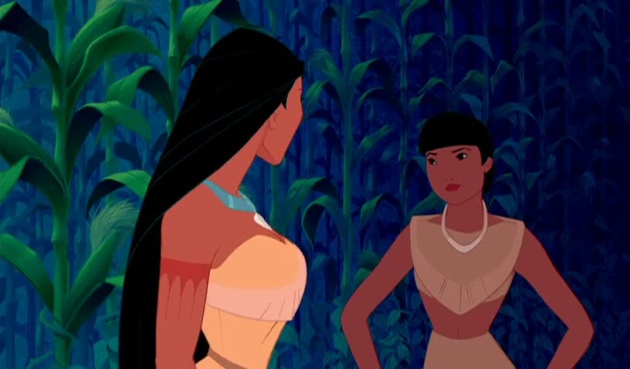
Pocahontas - 1995
Whether or not this movie passes depends on how you define a conversation. There's no one scene that where two female characters never talk about a male character. But I feel like much of the dialogue between Pocahontas and her best friend Nakoma in their first scene together could be counted as a separate conversation from Nakoma telling Pocahontas that her father has returned. The argument that Pocahontas discussing her dream with Grandmother Willow is separate from the two talking about Pocahontas's impending marriage is tougher since there isn't a break between the two subjects. I'm calling it a pass, but by a slim margin.
Verdict: PASS
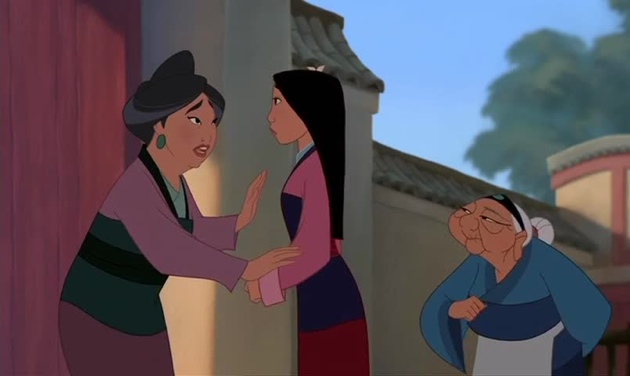
Mulan with her mother and Grandmother. Copyright Disney
Mulan - 1998
Most of the conversations between women are either about prepping Mulan for the matchmaker or between Mulan and the matchmaker, so there are direct and indirect references to men peppered throughout. But it's all pretty vague, as no specific man is ever being discussed. If every single exchange made mention of marriage or a husband, I'd be more torn about how to judge this one. But since it doesn't and the conversations are as much about how ill-prepared Mulan as they are about her potential marriage to a theoretical guy, I think this one safely passes.
Verdict: PASS
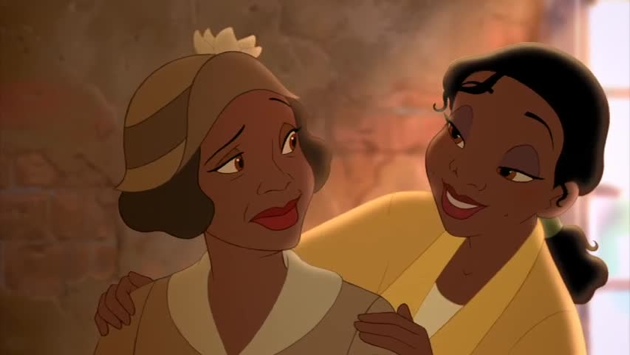
Tiana with her mom. Copyright Disney
The Princess and the Frog - 2009
Hoo boy, did this one give me a headache. Tiana spends most of the movie completely uninterested in romance, but men seem to keep working their way into her conversations with other women. Part of the problem - from a Bechdel test standpoint - is Tiana's father. He has died by the time the opening titles roll, yet his influence is felt through the entire film, as the source of Tiana's dream to run her own restaurant and the ultimate inspiration for her realization that she needs to balance her goal with a personal life and relationships with other people. So even when he's not in the movie, he's frequently the subject of conversation or hovering around the edges. Even when she declines her friend Georgia's invitation to go out dancing,, a couple of their male friends join in on the conversation, albeit briefly.
I keep going back and forth, but given how I judged some of the other films, I'm going to call this a narrow pass.
Verdict: PASS
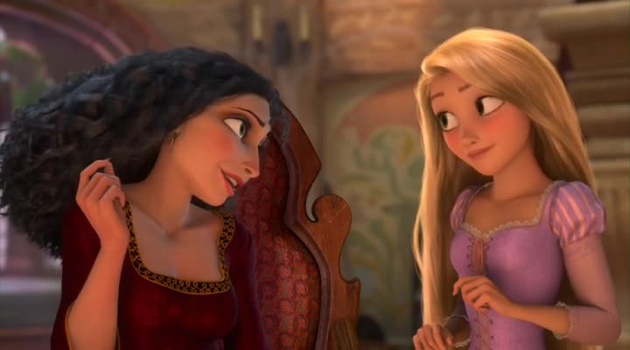
Mother Gothel and Rapunzel. Copyright Disney
Tangled - 2010
Now this one is easy. Rapunzel and Mother Gothel talk quite a bit and several of their conversations have nothing to do with male characters. I do find it interesting that several of the Disney princess films that pass the test only do so because of conversations between the female lead and the villain. In some cases, they're the only two prominent female characters in the movie. It doesn't mean it doesn't pass, or even that the films in question are bad or anti-feminist. It's just another example of the limitations of the Bechdel Test.
Verdict: PASS
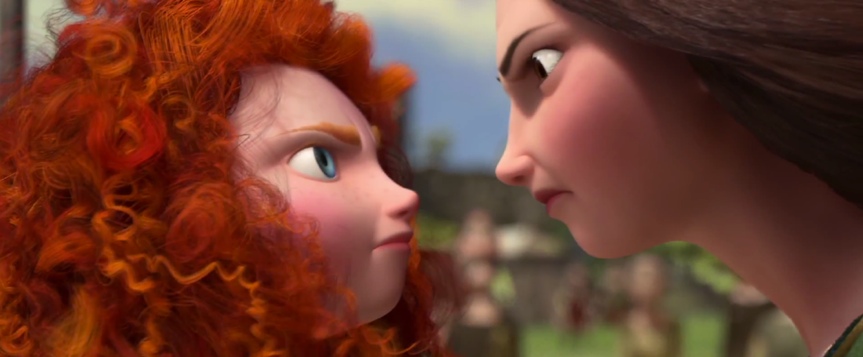
Brave - 2012
Do you really need me to tell you? Even if you'd only seen the trailers for Brave, you could probably guess how it would do on the Bechdel test. The entire movie is about the relationship between Merida and her mother Elinor, so obviously, they're going to talk. Sometimes it's about the male characters, but a lot of the time it isn't. Elinor even loses the ability to talk and they still manage to have back and forth exchanges.
Verdict: PASS
Final Verdict
Out of eleven Disney Princess movies, nine pass the Bechdel Test and two fail it. Is that a good pass to fail ratio? It's tough to say. Compared with a lot of Bechdel tests I've seen on groups of films like Best Picture Oscar nominees, the princess film do extremely well. But I would be curious to see how the performance of these films on the Bechdel Test compares to eleven films from a different animation studio, or eleven films with similar subject matter from the same years that the princess films were released in. As I said back in the first article, the Bechdel Test works best as a comparison tool, so the more data you have to compare, the better. Consider also that all but one of these movies have women as either sole protagonist or co-protagonist of the movie. So maybe the high Bechdel Test score for the Disney princess movies is a given or lower than you would think.
One surprising result of the Test is that the two films that didn't pass are both relatively recent movies. The original three princess films all passed, two of them without question. Again, this doesn't mean the older films are paragons of feminism, or that the modern films are inherently less feminist. But I would never have guessed that all three of the oldest princess movies would pass the test where two more modern films failed.
So that's the Disney Princess Bechdel Test. Do you agree or disagree with the results? Are you surprised by them, or was it pretty much what you expected? What other groups of films do you think should be put through the Bechdel Test?
